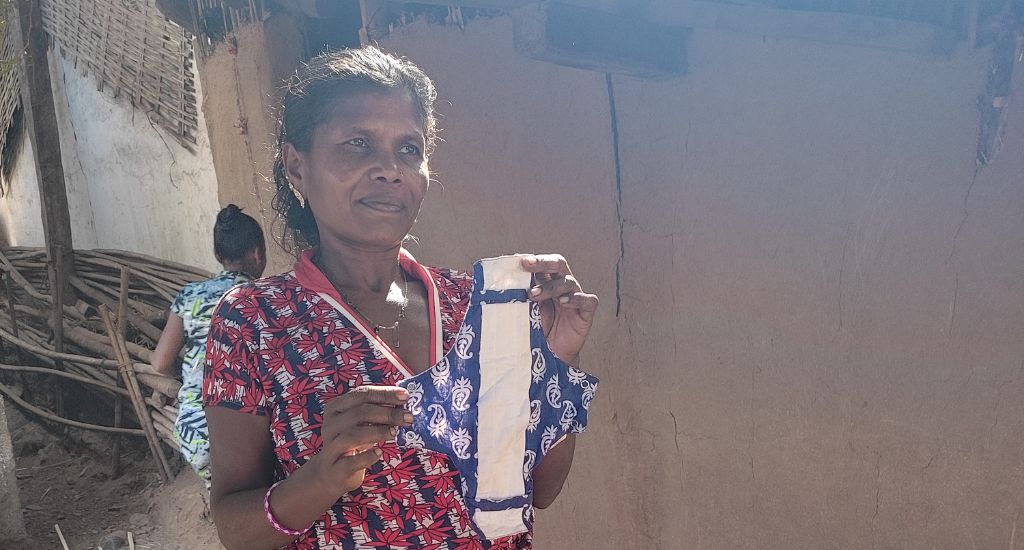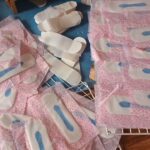Chinchinagautha village in Dang district of Gujarat has 84 households. The village is home to two tribal communities – Kotwalia and Kokni.
The Kokni community owns land and is comparatively well off. The Kotwalia community comprises around 50 landless families. The Kotwalia men and women make toplis (bamboo baskets) by collecting bamboo from the nearby forest. They earn about Rs 1,500 a week. The baskets are bought for Rs 12 each by merchants from Surat, Nashik and Aurangabad. This is the major source of income for the Kotwalia community, other than the seasonal employment they get as farm labourers during the monsoon.
No water, no toilet
In 2017, not a single household of the Kotwalias in the village had a toilet. The village had a well but there was no piped water supply to the houses. Sanitation was a big problem for the villagers.

“We had to defecate in the open back then, and the Koknis and other villagers called us ‘disease carriers’. Only they had functional toilets with piped water supply,” said Jessu Ben, a Kotwalia woman, adding that the practice of open defecation was not followed by them out of choice.
No more open defecation
Their lives changed when the Aga Khan Rural Support Programme, India (AKRSPI) stepped in to change the situation.
It conducted capacity-building sessions for the community on sanitation, importance of hygienic menstrual management and training women to tailor cloth menstrual pads. The government supported the initiative through investment in sanitation infrastructure, water tank, toilets and pipeline connection to toilets.
After the toilets with assured water supply were built, all the villagers began using them.
The menstruation taboo
Women and adolescent girls of the village had been using cloth bought from the market for Rs 20 each during menstruation.
They were not even willing to bring out the cloth and show it to the field workers when asked. They called the woman field worker ‘shameless’ for asking them about menstrual products.

The women were sure that nothing would happen if they did not change their menstrual cloth frequently because they sit and make baskets. Since they did not move about much, they often did not change the menstrual cloth until night.
They used to wash the cloth in cold water and dry it on a clothesline hidden under other outerwear. Or they dried the menstrual cloth inside toilets where no one could see it because of the shame ingrained in them for generations.
Menstrual hygiene
After understanding the whole scenario, the field workers conducted sessions on menstrual hygiene and management.
“I had to bring a sanitary pad and tear it apart to show what a commercial pad is made of. I poured water on it,” said Ribka Ben, MHM trainer, AKRSP(I). The absorption capacity of commercial pads and the cloth used by the women were shown parallelly.
Along with training to stitch pads, awareness on the impact of deodorised, scented, polythene-based commercial pads on the health of women and the environment was carefully woven into the training sessions.
“Training them to stitch cloth pads didn’t take long. But to change their attitude to find dignity in menstruation and accept that there is no shame took more time and effort,” said Ribka Ben.

But now the women understand the benefits.
“The snap buttons keep the pad in place and also it does not crumple when wet since layers of cloth are stitched together,” said Savita Ben, another woman resident of the village.
The women now wash the used pads in hot water and dry them in sunlight to make sure they are safe for the next use.
Currently, all the women are using cloth pads made during the training. The government department had brought the machines only for the training programme. So they are in need of machines to continue to stitch cloth pads.
Making and selling cloth pads can also be a source of livelihood for the landless women. This village shows us the path toward equitable and sustainable gender-sensitive sanitation and water management.
The lead image at the top shows Savita Ben showing the cloth pad she stitched during the training (Photo by Sameera Kasulanati)
Sameera Kasulanati is a researcher at Pune-based VikasAnvesh Foundation.








